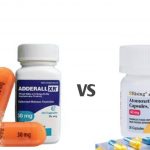How Long Does Adderall Stay In Breastmilk?

Breastmilk is the perfect food for your baby. It contains just the right amount of nutrients. It is also gentle on your baby’s developing stomach, intestines, and other body systems. Many medical experts, including the American Academy of Pediatrics (AAP) and the American College of Obstetricians and Gynecologists, strongly recommend breastfeeding exclusively for 6 months.
However, for women taking certain prescription medications, this can be a challenge because when our body begins to metabolize a medication, different organs process the ingredients before they are finally released into the bloodstream and some of them end up in the breast milk. Studies have shown that although most medicines are excreted in breast milk to some degree, the amount is usually less than 10% of the maternal dose. Medicines excreted at less than 10% are considered compatible with breastfeeding.
What is Adderall?
Adderall is a combination of Dextroamphetamine and amphetamine used as part of a treatment program to control symptoms of attention deficit hyperactivity disorder (ADHD; more difficulty focusing, controlling actions, and remaining still or quiet than other people who are the same age).
Adderall is used to treat ADHD in adults and children 3 years of age and older. Adderall XR is used to treat ADHD in adults and children 6 years of age and older. Mydayis is used to treat ADHD in adults and children 13 years of age and older. Adderall is also used to treat narcolepsy (a sleep disorder that causes excessive daytime sleepiness and sudden attacks of sleep) in adults and children 12 years of age and older.
How Adderall works
Adderall is in a class of medications called central nervous system stimulants. It works by changing the amounts of certain natural substances in the brain.
How should I take Adderall?
Take Adderall exactly as prescribed by your doctor.
ADHD: In children from 3 to 5 years of age, start with 2.5 mg daily; daily dosage may be raised in increments of 2.5 mg at weekly intervals until optimal response is obtained. In children 6 years of age and older, start with 5 mg once or twice daily; daily dosage may be raised in increments of 5 mg at weekly intervals until optimal response is obtained. Only in rare cases will it be necessary to exceed a total of 40 mg per day. Give first dose on awakening; additional doses (1 or 2) at intervals of 4 to 6 hours.
Narcolepsy: The usual dose is 5 mg to 60 mg per day in divided doses, depending on the individual patient’s response.
Follow all directions on your prescription label. Your doctor may occasionally change your dose. Do not take this medicine in larger or smaller amounts or for longer than recommended.
Adderall may be habit-forming. Never share this medicine with another person, especially someone with a history of drug abuse or addiction. Keep the medication in a place where others cannot get to it. Selling or giving away this medicine is against the law.
Read all patient information, medication guides, and instruction sheets provided to you. Ask your doctor or pharmacist if you have any questions.
You may take Adderall with or without food, first thing in the morning. Do not crush, chew, break, or open an extended-release capsule. Swallow it whole.
To make swallowing easier, you may open the capsule and sprinkle the medicine into a spoonful of applesauce. Swallow right away without chewing. Do not save the mixture for later use.
While using this medicine, your doctor will need to check your progress at regular visits. Tell any doctor who treats you that you are using this medicine.
Adderall can cause unusual results with certain medical tests. Tell any doctor who treats you that you are using this medicine. Do not take Adderall if it is expired or appears to have been tampered with.
How Long Does Adderall Stay In Breastmilk?
There are several factors that come into play when estimating how long Adderall will stay in your breastmilk because every patient has a physiology unique to them. Here are some major factors you should consider when trying to understand how long Adderall will stay in your body:
• Age: Typically, the younger you are, the more efficient your body functions are. The more efficient your body functions, the faster Adderall will be removed from your breastmilk.
• Body height/weight/fat: Your specific prescribed Adderall dosage corresponds to your body height, weight, and fat. Usually, larger people will be given a higher dosage of Adderall. The higher the dose of Adderall you have been taking, the longer Adderall will take to be removed from your breastmilk.
• Genetics: Genes predispose people to different metabolic functions, which is a key factor in how your body processes medications like Adderall. For this reason, your genetic makeup comes into play when estimating how long Adderall will remain in your breast milk.
• Kidney and liver functions: The liver and kidneys eliminate everything you ingest, and Adderall is no exception. If your liver or kidneys are damaged, it will most likely take longer for your body to remove the Adderall from your breast milk.
• Metabolism: Your metabolism determines how quickly you process foods, liquids, and medications such as Adderall. If your metabolism is slow, it will take longer for your body to process and eliminate Adderall from its breastmilk than a woman with a fast metabolism.
• Usage frequency: The longer you have been taking Adderall, the longer it will remain in your system. For example, it will take longer for a woman who has taken Adderall for several years to remove Adderall from the body than a woman who has only been taking Adderall for a few months.
Adderall has a half-life of approximately 9 to 14 hours, meaning that only half of the drug remains in the body after this period. Adderall is metabolized by the cytochrome P450s and eliminated unchanged in body fluids. About 20-25% of it is converted to metabolites, including hippuric and benzoic acids.
Adderall can stay in a woman’s breast milk for up to 3 days after it was last taken. The presence of Adderall in a woman’s breastmilk can cause her to test positive for amphetamine but not methamphetamine. Amphetamine does not metabolize to methamphetamine.
In addition, a woman taking Adderall can breastfeed her child while taking the medication even at the maximum recommended doses for ADHD. However, there is a growing concern that since the drug may pass through the breastmilk, it can slow the baby’s growth and interfere with appetite and sleep. Another concern is that Adderall may interfere with the mother’s milk production. For these reasons, the FDA recommends not taking Adderall or Adderall XR while breastfeeding.
What are the likely side effects of Adderall?
Adderall may cause side effects. Tell your doctor if any of these symptoms are severe or do not go away:
• changes in sex drive or ability
• constipation
• diarrhea
• dry mouth
• headache
• nausea
• nervousness
• painful menstrual cramps
• weight loss
Some side effects can be serious. If you experience any of the following symptoms, call your doctor immediately or get emergency medical treatment:
• agitation, hallucinations (seeing things or hearing voices that do not exist), fever, sweating, confusion, fast heartbeat, shivering, severe muscle stiffness or twitching, loss of coordination, nausea, vomiting, or diarrhea
• believing things that are not true
• blistering or peeling skin
• changes in vision or blurred vision
• depression
• difficulty breathing or swallowing
• dizziness
• feeling unusually suspicious of others
• hallucinating (seeing things or hearing voices that do not exist)
• hives
• hoarseness
• itching
• mania (frenzied or abnormally excited mood)
• motor or verbal tics
• pain, numbness, burning, or tingling in the hands or feet
• paleness or blue color of fingers or toes
• rash
• seizures
• slow or difficult speech
• swelling of the eyes, face, tongue, or throat
• teeth grinding
• unexplained wounds appearing on fingers or toes
• weakness or numbness of an arm or leg
Adderall may cause sudden death in children and teenagers, especially children or teenagers with heart defects or serious heart problems. This medication also may cause sudden death, heart attack, or stroke in adults, especially adults with heart defects or serious heart problems. Call your doctor right away if you or your child has any signs of heart problems while taking this medication including chest pain, shortness of breath, or fainting. Talk to your doctor about the risks of taking this medication.
Adderall may slow children’s growth or weight gain. Your child’s doctor will watch his or her growth carefully. Talk to your child’s doctor if you have concerns about your child’s growth or weight gain while he or she is taking this medication. Talk to your child’s doctor about the risks of giving Adderall to your child.





